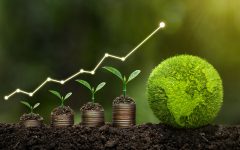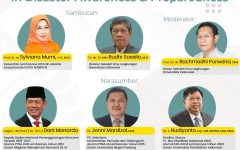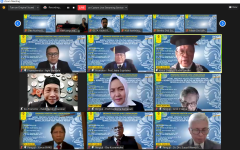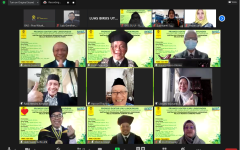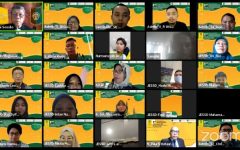SIL UI Daring Seminar #2 presents Two Ministers Of Health Of The R.I. (in the Development Reform Cabinet and the 2014-2019 Working Cabinet)
August 9, 2023 2024-12-21 17:17SIL UI Daring Seminar #2 presents Two Ministers Of Health Of The R.I. (in the Development Reform Cabinet and the 2014-2019 Working Cabinet)

SIL UI Daring Seminar #2 presents Two Ministers Of Health Of The R.I. (in the Development Reform Cabinet and the 2014-2019 Working Cabinet)
After successfully holding online seminar #1 by capturing 500 zoom participants and 8549 viewers on the SIL and SKSG Public Relations youtube link in the framework of the 4th Anniversary on July 12, 2020, the University of Indonesia School of Environmental Sciences (SIL UI) held another online seminar series #2 with the theme “Reforming Sustainable Environmental Management: Environmental and Social Management during the Covid-19 Pandemic”. The theme raised by SIL UI this time was motivated by unrest about the Covid-19 pandemic. Some people have not realized that the current Covid-19 pandemic cannot be separated from the effects of environmental and natural resource destruction. This was explained by the Chairman of the SIL UI School Committee, Prof. dr. Haryoto Kusnoputranto, S.K.M., Dr.PH. in his speech.
Inviting 2 Ministers of Health during the Development Reform Cabinet and the 2014-2019 Working Cabinet, Prof. Dr. dr. Farid Anfasa Moeloek, Sp.OG (K) and Prof. Dr. dr. Nila Djuwita F. Moeloek, Sp.M (K), this seminar was successfully watched by 525 zoom participants and 5712 viewers on the youtube link of SIL Public Relations and SKSG.
An increase in population can lead to higher consumption. It affects the rate of deforestation so that the balance of the ecosystem will be disrupted and create a pattern of infectious diseases such as Covid-19, SARS and MERS. Deforestation can cause loss of biodiversity as a balance of natural life. If the ecosystem is damaged, the easier the development of infectious diseases. In addition, deforestation will cause a lack of availability of raw materials for medicines that can strengthen immunity in the human body. Deforestation can also spread pathogen-carrying organisms due to the disruption of natural habitats, and this pattern will cause organisms to migrate to new places and cause new diseases and the pattern of disease spread will be wider.
The impact of a pandemic can be minimized through a sustainable development system. Environmental changes must refer to sustainable development patterns so as to reduce the risk of disease, increase food production, and conserve biodiversity. By implementing a sustainable development system, the global pandemic that will occur can be anticipated early on. In accordance with WHO recommendations, global pandemics must be anticipated by establishing an agenda early on through the right approach, adequate knowledge of previous disease outbreaks, and global community involvement. Therefore, it is important to educate communities/groups about sustainable development that can maintain ecosystem stability so as to prevent the emergence of new diseases.

Prof. Dr. dr. Farid Anfasa Moeloek, Sp.OG(K) as the Keynote Speaker at this seminar said that environmental imbalance can trigger disease. Therefore, the study of environmental science, with existing theories, can solve problems that occur in the environment comprehensively by considering aspects of the natural environment and the socio-cultural environment. The study of environmental science is a solution to maintain the balance of the ecosystem to be maintained and balanced.
The next session continued with the delivery of material by the seminar speakers moderated by Dr. Ahyaudin Sodri as a SIL UI lecturer. The first material was delivered by Prof. Dr. dr. Nila Djuwita F. Moeloek, Sp.M (K) regarding health management reform to overcome the Covid-19 pandemic. He explained that health is included in one of the Sustainable Development Goals (SDGs) which are interrelated with one another. In responding to the current pandemic, a holistic collaboration between health institutions and the community is needed. The intended holistic collaboration is that groups within health institutions do the future of medicine and those outside health institutions do the way of thinking so that they become productive healthy communities with prevention and education to other communities.

Based on the theory of H.L. Blum (1974), health status can be influenced by 40% environmental factors, 30% community behavior factors, 20% health service factors, and 10% genetic factors. So that environmental factors such as the natural and socio-cultural environment and community behavior factors have a major influence in improving health status. Changes in behavior or lifestyle are one of the keys to achieving the Healthy Indonesia Program and the formation of superior Human Resources (HR).
According to his presentation, things that need to be improved as opportunities in overcoming health problems are improving public nutrition through the food sector, overhauling the health system as a whole including health insurance, and improving communication and education facilities that are packaged holistically. Suggestions for effective handling of the pandemic for health agencies are the separation of hospitals for Covid-19 patients and non-covid-19 patients in an effort to reduce the mortality rate of each patient. In addition, further research is needed on medicines derived from herbal ingredients or phytopharmaca.
In closing, he emphasized that health cannot stand alone. Health is closely related to poverty, poverty is related to low knowledge. Disease is closely related to food security and safety, disease is also related to the availability of clean water and sanitation. Health is downstream of behavior and environmental degradation.
The second material was delivered by Dr. dr. Tri Edhi Budhi Soesilo, M.Si. regarding the formation of individual and social behavior in environmental management efforts to overcome the Covid-19 pandemic. Data on Covid-19 cases as of July 28, 2020 have been confirmed positive as many as 102,051 people and are still increasing at a rate of approximately 1500 cases per day. The high number of cases is because the tests are getting better and the coverage is increasing. Predictions of future trends in the number of cases will increase. Many models have been created to predict the peak of cases and the end of the pandemic. However, these predictions cannot be said to be final because it depends on the number of interventions carried out.

The way to handle Covid-19 is to solve the cause of transmission, namely human behavior that does not comply with established health protocols so that the impact of the pandemic can be minimized and then will disappear. The handling of the Covid-19 pandemic in Indonesia is still unfocused and unintegrated, even though the government has formed the Task Force for the Acceleration of Covid-19 Handling. As a result, the reactions that occurred in the community at the beginning of the pandemic hit Indonesia were very diverse in response to the regulations and statements of many government officials who “confused” the community.
The impacts of the Covid-19 pandemic initially focused on health aspects, but in the following time the impacts began to appear in other aspects, namely the economy, socio-culture, and the environment. Environmental recovery efforts, in accordance with its principles, are focused on mitigating negative impacts and even eliminating them and encouraging and enhancing positive impacts.
Because the negative impacts that arise are generally due to human behavior, the key word for the success of environmental recovery efforts is changing human behavior. Such as, self-discipline, setting a good example starting from the leader so that the whole community can follow, and mass movement cooperation for Covid-19 socialization.


In closing, he emphasized that all actions and efforts, energy, costs incurred that are carried out to reduce the number of positive people with Covid-19 will not be optimal and even have no results if individual human behavior, in Indonesia in particular, is not changed in accordance with the methods that have been delivered.
Information on further events and online seminars will be informed through the social media of the School of Environmental Sciences, University of Indonesia.

